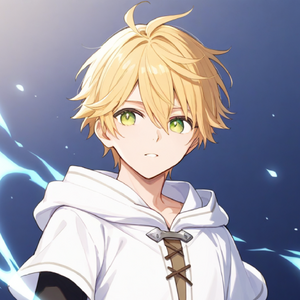Magic was an undeniable force in this world, but not in the way I'd imagined. It was woven into the fabric of everyday life. Earth, wind, water, and fire—these were the elements most people wielded, mainly for practical tasks like farming, repairing tools, or fixing homes.
But those who wanted more, who sought to become mages, trained harder. The village had a small militia of mages—most trained locally, but some had gone to universities across the vast country of Thurisgard, where I now realized I lived.
The magic system here was unlike anything I'd seen in video games. Magic wasn't restricted to specific spells; it could be shaped and manipulated, as long as it adhered to science. If you understood the fundamentals, there were no real limits to what you could do.
Every element had its own evolution path. Fire could become Lava, and then Plasma. Water could freeze into Ice, then shift to Steam. Earth could transform into Metal, then into Gravity. Air could become Lightning, and finally, Sound. Each evolution was more powerful than its base form, but they came with their own challenges—more mana to use, and a greater skill required.
Though the four basic elements dominated, there were also two rarer forms of magic—Light and Darkness—but the book didn’t go into much detail about them.
And then there was mana—the essence of creation, the lifeblood of magic. Mana was easy to control, but it was also easy to waste if you weren’t careful. Every spell you cast drained your mana, and the more you used, the quicker it drained.
This concept of mana was tied to a body organ, the "mana core," which all humans were born with. Similar to other organs, it didn’t regenerate naturally. No one had ever healed or regrown a mana core.
The mana core was lumpy when you were born. It wasn’t efficient. The smoother the mana core, the more mana you could hold and the more efficiently you could use it.
Everyone started with a lumpy mana core, and over time, with practice, you could smooth it out, by using magic or by meditating. The process was slow, though, and required constant effort. You naturally regenerated mana, but it was a slow process, meditating would speed this up.
Everyone had an affinity for certain elements, sometimes all, sometimes none. Even if you had no affinity, you could still cast basic spells—but they’d cost more mana, and you’d need more concentration.
Argun, the village I now called home, had no real books on advanced magic. Only the basic “rules” book was available at the village library. I wish there was more on elemental magic, I thought often.
Four months had passed since I found myself here, and by now, I knew the basics of the magic system and had a good sense of the geography. I’d kept up the act of being Nikolai, but it weighed on me more and more. Guilt was eating at me, and I wasn’t sure how much longer I could keep pretending.
I walked out of the library and headed toward the village hall where my father worked. The chief of the village and the commander of its militia, my father was also the strongest mage here. When I entered, he was buried in paperwork, but when he saw me, his face brightened.
“Nikolai, my boy, what brings you here today?”
“I noticed there’s no book on casting spells at the library. Can you teach me?” I asked, trying to sound casual.
His smile faltered for a second. “I wish I could, but I’m buried in work right now. But I can give you some pointers.”
It wasn’t what I’d hoped for, but I understood. The village relied on him, and he couldn’t drop everything for me.
“Start with an element you're most likely to have an affinity for,” he said, leaning back in his chair. “Since I have an affinity for water, and your mother has both water and fire, water is probably a safe bet for you.”
“Does having both your and mom’s affinity make mine stronger?” I asked, raising an eyebrow.
He nodded. “Smart boy! Yes, it does. It’s the same with the affinity of our ancestors. Your bloodline makes a difference.”
I frowned inwardly. So, you can breed super-mages? That’s gotta be a thing somewhere...
“Visualize the spell clearly when you cast,” he continued, his tone serious. “Think of it like opening a dam slowly, not a flood. If you pour too much mana in too fast, you’ll drain yourself instantly.”
I nodded, appreciating his wisdom. “Thanks, Dad. I’ll practice.”
I left his office and headed to the lake near the village. The place was perfect for practicing water magic, with its calm surface reflecting the sky. I focused on the task at hand, trying to visualize a ball of water forming in front of me.
At first, nothing happened. But then, I imagined the water pooling slowly, filling the space between my hands. A soft pulse of mana surged through me, and to my surprise, a small ball of water materialized.
I grinned. Okay, this isn’t so bad.
Next, I focused on making the ball bigger. I pictured the dam opening wider, allowing more mana to flow. The sphere grew, but as it did, I felt a sharp drain on my mana. Still, it shot forward, hitting the lake with a satisfying splash.
This is going to be a workout and a spell-casting routine, I thought with a grin, feeling the burn of mana draining from me.
Then an idea struck me.
I took a deep breath and focused on my ki. Instead of just turning it on like a switch, I visualized a dam opening and letting a trickle of ki flow out. I felt the familiar flow of energy, but this time it was different—it wasn't a raging torrent of ki, it was a controlled flow.
I looked at my hands, felt my body, and then I smiled. “No pain… No pain!”
I could now control my ki.
I’m not a mage, I am something else.











Comments (0)
See all